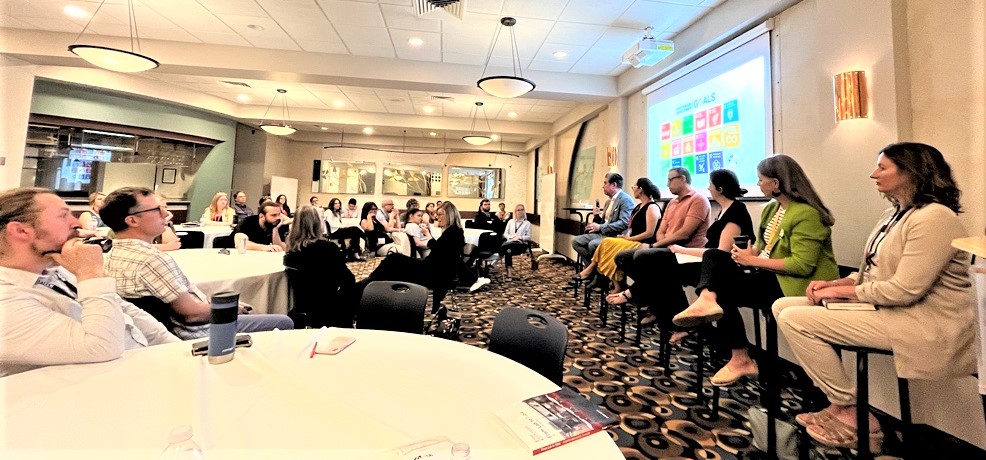Applied research and collaboration the key to realizing Sustainable Development Goals (SDGs)
RRC Polytech is committed to leading meaningful change on a global scale, so exploring how the College can harness the power of applied research and collaboration to realize international Sustainable Development Goals (SDGs) was a natural fit for a panel discussion at RED Forum – an annual professional development day for faculty and staff.
SDGs are the 17 calls to action in the United Nations shared blueprint for peace and prosperity for people and the planet, now and into the future. The strategies to improve health and education, reduce inequality, spur economic growth, and tackle climate change align with RRC Polytech’s values and the diversity of the panel’s areas of expertise demonstrated how collaboration plays a critical role in working toward them.
The panel featured RRC Polytech experts:
- Stephanie Fulford, Sustainability Specialist, Environmental Stewardship and Campus Renewal
- Dr. Rob Santos, Chair, Research School of Health Sciences and Community Services
- Elena Gomez Haro, Research Manager, Prairie Research Kitchen (PRK)
- Ginger Arnold, Instructor, Social Innovation and Community Development Programs
- Dr. Arman Vahedi, Instructor, Civil Engineering Technology
Dr. Jolen Galaugher, Director of Research Partnerships and Innovation (RPI) moderated the discussion and invited each panelist to share some results of their projects and initiatives in relation to SDGs. Each specialist identified and connected elements of their work with the goals in their area of focus.
Stephanie Fulford described the benefits of waste auditing and engaging the entire College community in composting. At the Prairie Research Kitchen (PRK), Elena Gomez Haro explained how they are developing alternative food options that upcycle waste products to shrink our carbon footprint. Engineers are instinctive problem solvers, so Dr. Arman Vahedi spoke about his students’ water treatment studies testing the effect of pharmaceuticals on aquatic life in remote lakes. Ginger Arnold promoted a new climate change class for her students in the School of Indigenous Education, that will build on the established respect Indigenous people have for Mother Nature. Dr. Rob Santos spotlighted the impact of the College’s work developing Early Childhood Education training for the progressive Abecedarian Approach.
On the surface these positive endeavours appeared to be separate and distinctive but as the conversation flowed examples of common successes and challenges also emerged, revealing how interwoven and interdependent each department really is.
The intersecting issues prompted an exchange of ideas and advice from the PRK’s approach of educating clients through access, to instructors seeking related capstone projects for students, to geo-coding benefits and the overall need for everyone to convert the latest science into progress. The panelists highlighted the advantages of making a coordinated effort like accelerated knowledge transfer and ultimately demonstrated how applied research often acts as a common bond in positively impacting change.
“RRC Polytech’s combination of expertise, perspectives and resources provides us with a unique opportunity to bring together staff, faculty, and students with community and industry partners to achieve real progress in the wide variety of fields that the Sustainable Development Goals address,” said Dr. Galaugher.
“Regardless of their specialty, the panelists agreed that innovative solutions achieved through applied research expedite the process by empowering others with better tools, technologies and techniques so we can reach our shared objective – to realize social, economic and environmental sustainability on both a local and a global scale.”
The panel was also in agreement that funding remains the most difficult barrier to overcome, followed by time, but that by offering different paths to the same endpoint RRC Polytech will continue to inspire students to get involved and do more.
There is still much work to be done but because cumulative growth increases the probabilities of achieving SDGs, all successes at the College are connected. Manitoba’s polytechnic must continue to play a leadership role in advancing SDGs by working with industry to bridge gaps and prioritizing collaboration and applied research.

